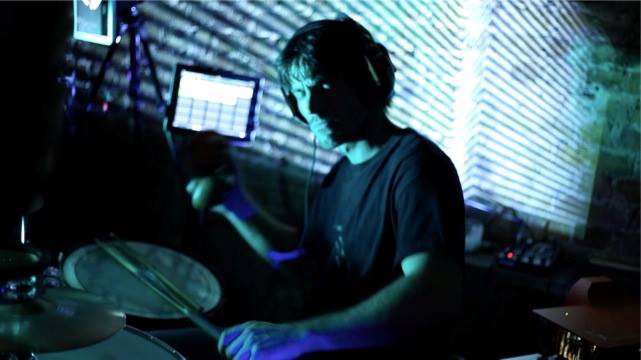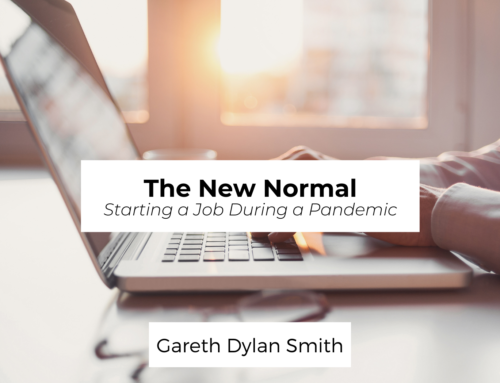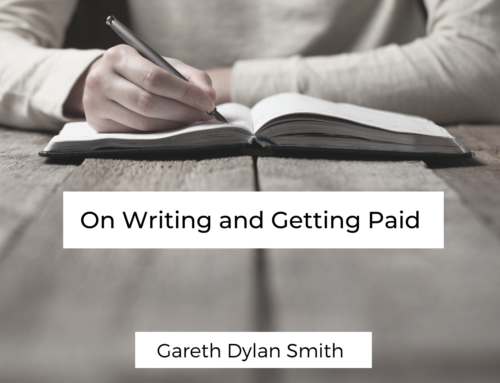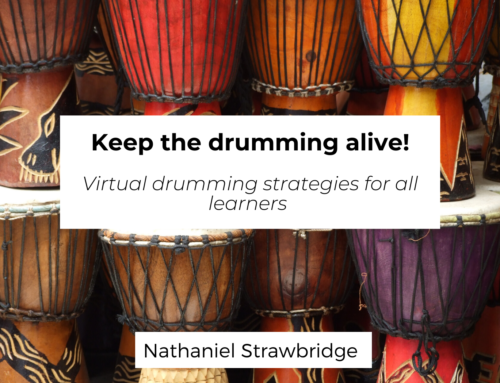
Gareth Dylan Smith Drumming (with His Eyes Closed)
When we’re teaching rhythm section workshops and other performance classes at the college where I work, my fellow teachers and I often tell the students to look around and pay attention to those with whom they are playing on stage. I believe this to be sound advice, since a lot of the time inexperienced ensemble players will appear to be in their own world entirely, disconnected almost completely from the music that could be happening if only they would play with their band rather just at the same time as their fellow musicians. However, it is advice that often I do not follow myself. I play a lot of the time with my eyes shut. I don’t deliberately not look around – I just find that I can connect better with the others by listening to them. Sounds obvious as a musician, now that I think about it. I have noticed that on many occasions – and the best ones at that – I tend to play with my eyes closed, but I’m not ignoring the rest of the band. On the contrary, these are the times when I’m paying the closest and most focussed attention. I rarely block myself off from visual stimuli in a conscious effort to listen more intently, but frequently discover (when I blearily open them) that I have had my eyes closed for some time. This article is a brief musing on my inadvertent practice; hopefully it may trigger something in fellow teachers for reflection, or for discussion with students
When I play in Gillian Glover’s band, as I have been doing a quite a bit recently, I often find myself opening my eyes at the end of a song. I usually don’t notice that they are closed while we’re playing; I find only that I cam completely absorbed in the song – the music is all I hear, all that I am in those moments. Coming out of the music (as happens when I open my eyes) is a little like coming out of a deep and immensely satisfying sleep. Going in to the music, I am happy to descend, contented to be enveloped by it entirely. Being in a song, or in a piece of music is like a total immersion of my self – emotionally, mentally, physically.
I have similar experiences in the blues-rock band in which I play; we groove together easily. We lock in as an ensemble immediately in rehearsals, and can begin work on the perfecting architecture of individual songs – the oneness, the ‘magic ride’ (to quote Grateful Dead drummer and ethnomusicologist Mickey Hart) is already there. Owing to the nature of the music that we play, I often lay down rhythms with little or no variation for a minute or more. This experience becomes wholly immersive, entrancing and absorbing as I repeat the pattern over and over. I become part of what I play in real time as I play it. With a groove of equal commitment being simultaneously realized by the band’s guitarist and bassist, the feeling is bigger, deeper, more intense. The listening and feeling become one in a cyclical, instantaneous intra-personal feedback loop between my head, hands, feet and every sinew of my body; and, on the best days, every part of my being. The loop is also inter-personal, and how I wish it could be every time I play. I find it frustrating when I (or we) cannot achieve this sense of oneness, of total submersion, for whatever reason.
I owe a debt of gratitude to my friend Steve. He is the first musician with whom I felt this greater-than-the-sum-of-its-parts awesomeness that transports us both to another plane of being (he too closes his eyes when we play.) How incredible, as well, was the sensation – repeated again and again – when Steve and I found our bassist, Hannah, to be the perfect player to complete the trio! I remember blinking into the lights of our rehearsal studio on many occasions when we had worked on songs – we had no need to look at one another. It was all about the immersive, submersive, experiential phenomenon of being together in the same place, at the same time and in the same way. Amazing.
I do not need to close my eyes in performance, but nor do I need to keep them open. What I feel an imperative to do is to pay attention as completely as possible. I open my eyes when I need to look around or give a visual cue to someone else in the band; or when one of us makes a mistake. Instances of the latter are quite arresting, and I react to my own mis-hits with the same sense of disruption as when a band-mate slips up. ‘Awakening’ in this way brings me back to another level of reality – and I much prefer the one where we’re quite literally all about the music and my eyes are closed.
Noted music educator David Elliot wrote in his 1995 book Music Matters that listening ought to be an integral part of any musical endeavour, any form of musicing. Perhaps inevitably, this is so – at least for those of us who are successful in music (by which I mean those of who succeed in making music – not those who reap significant commercial or financial rewards for the music that they have made and turned into commoditized artefact). I recall the advice of my drum kit teacher and guru while I was at the (now Royal) Welsh College of Music and Drama in the late 1990s: Peter Fairclough told me that the only thing I should consciously do on stage is to listen. Clearly such an aspiration depends on the agenda and the context of the music that I am playing. When I have to read a score and follow a conductor (depending in no small part on the ability or capriciousness of the MD on a given gig) I may need to pay a good deal of conscious attention to him and let the listening happen somewhat subconsciously. On loud, sweaty gigs with my punk band the Eruptors, I point my sticks at audience members because this is one of the tropes of authentic (and great fun!) rock performance; I twiddle one drum stick over my head while attempting a one-handed roll with the other. While this can be immensely satisfying in many respects, I find that performances of this kind appeal to something in me that is more physical than emotional. I am not belittling rock music or rock events – I love them and feel incredibly happy and excited when taking part. However, these are events that require a drummer to perform, to come outside of the music. At a rock concert, I am engaged in other reciprocations with audience and band members than attempting to summon a sublime musical experience – they expect interaction. While I enjoy Eruptors gigs – admittedly an emotional response – they feed the extrovert in me, rather than the soul-searching introvert. I am never entirely happy with rock performances, nor with only playing gigs that place higher value on intra-musical moments on stage, which is why I choose to play in a wide variety of contexts; this muso-schizophrenia is perhaps better left for discussion another time…
On occasions when I am afforded the ultimate luxury of the total human experience that for me is not internal or external but both – the (‘omni-ternal’?!) phenomenon of making music to which I am in that moment devoted, when I have only to concentrate on that, and when I am permitted so narrow a focus – this is when music exists wholly completely, albeit fleetingly, as something that only those who are there can understand. Almost always, achieving this means closing my eyes.
Is this mere self-indulgence? I do not think so. I believe that the self allows the music to be indulged, permits this to be so. And so it must be. If we are selfish (twiddling sticks and showing off, maybe trying too hard – and likely only part-succeeding as a result) we do not serve the music. And we must. Not because we are accompanists – quite the opposite, in fact – because we are the music. We drummers, we musicians, embody the music and it embodies itself though us, momentarily as we act as conduit, curator and creator. Music is a magical thing. It exists before we play it, as we play it, and directly after we have played it. I have to play in response to my decision to play in response to what I hear; as I play I make sound, and after that sound reaches my ears and those of the rest of the band or our audience, that music continues, and it continues as it affects and effects my and our next music-making decisions. With my eyes closed I am more vulnerable to the music. What I take in with my eyes distracts me, more often than not. What I take in with my ears and through the nerve-endings in my hands, arms, legs and feet only helps to make me more susceptible to the muse, to the music, to the embrace of our musicing.
Afterthought
The very best performers can share the oft-elusive feeling that I have tried to describe with audiences. I am unsure how they (or perhaps we) do that, or if any who manages it can provide an explanation; but when this happens, we all know, and it’s electrifying. It happened to me most recently at a gig at the Vortex jazz club in north London. It was the last tune at a gig by the Han Bennink trio. Bennink is renowned for his mad antics – sudden bursts of extraordinary energy, booted feet on the snare drum, attacking the furniture, that sort of thing – but after this song you could have heard a pin drop a mile away. No one in the audience or on stage moved. I don’t even think anyone breathed for about thirty seconds. The student I’d taken with me was stunned. As for Bennink, I didn’t spot whether his eyes were closed… but I reckon they might have been. Keith Tippet would understand; he too has transported audiences to another plane.




Leave A Comment